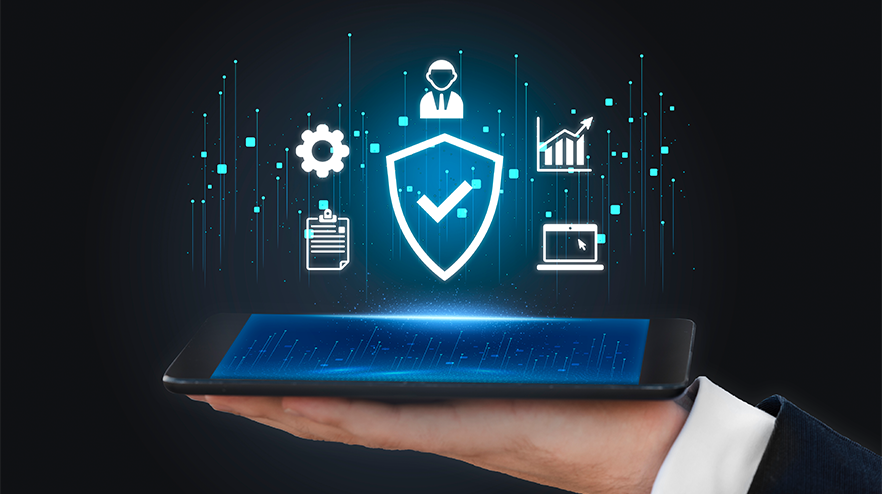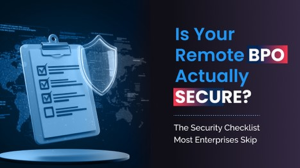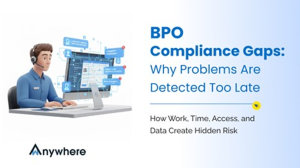Read summarized version with
Table of Contents
The security audit is a rigorous process that examines your company’s systems, applications, and even data flow for potential vulnerabilities that could be exploited. Whether it’s a software security audit or an information security audit, inspecting how sensitive information is stored and accessed to identify risks before hackers do.
For B2B businesses, the CEOs and business owners, this isn’t an IT job anymore; it’s a business-critical responsibility. Businesses often store sensitive information, everything from financial records to healthcare files, in their databases. Even small issues can ruin your brand reputation, breaking compliance regulations such as GDPR or HIPAA, and cause financial losses.
More than 60% of small firms lose their business within six months due to a cyberattack, as reported by the National Cyber Security Alliance. Choosing a reliable security audit software can help you find and fix problems more quickly. It offers real-time intelligence and helps maintain legal standards and reduce the risk of cyberattacks. The AI-powered audit tools automatically generate a security audit report and suggest data-driven strategies, keeping your infrastructure secure. These audits are necessary for survival, prosperity, and long-term confidence in a networked business world.
This blog helps you understand the types of security audit softwares, and how reliable Audit softwares can help you counter security challenges to boost productivity, security, and ensure compliance with regulatory bodies.
What is a Security Audit?
A security audit is a regular checkup for your company’s software, systems, and processes, designed to detect issues in its security practices. A software security audit detects bugs and risks in your applications, while an information security audit evaluates how data is stored, accessed and protected.
Security audits are necessary to comply with regulatory standards such as GDPR, PCI-DSS, and HIPAA. A non-adherence to these rules can result in costly penalties and loss of reputation, particularly in sectors such as healthcare, finance, and e-commerce.
A security audit also helps protect your clients’ sensitive data and your brand reputation from harm. Multiple record breaches could ruin client trust and potential business opportunities.
Security audit report provides a list of weaknesses and strengths, as well as the fixes that need to be applied, and assists CEOs and IT leaders in making better choices that will improve their cybersecurity approach.
What are the Different Types of Security Audits Businesses Must Consider
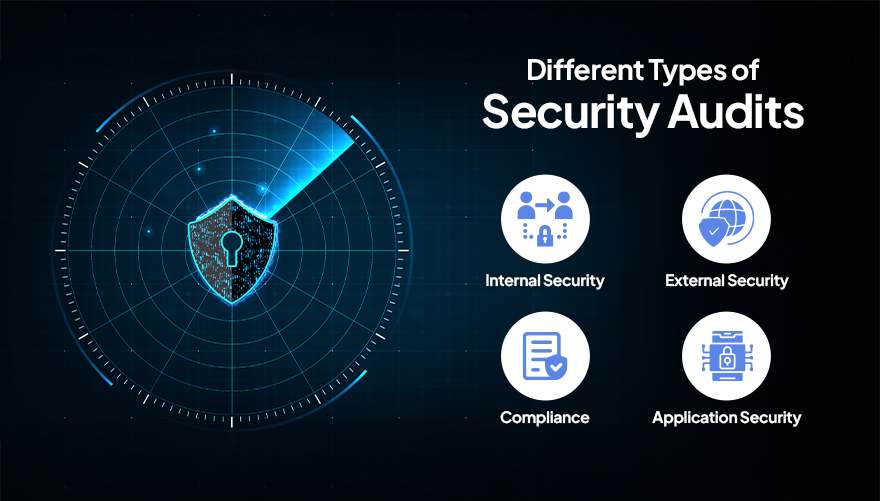
Security audits are crucial for maintaining security and compliance with regulatory bodies.
Before implementing audits, companies must understand the types of security audits:
- Internal Security Audits
Internal Security audits are performed by your IT department, that checks systems, policies, and controls. A robust security audit report can detect insider risks and help you prevent them and also improve some company policies before they turn into bigger issues.
Read more: How to use a Workforce System Audit Tool to monitor devices’ health and performance
- External Security Audits
External audits are performed by third-party professionals and provide an impartial assessment of your systems and identifying hidden risks. Businesses typically employ security audit software for external checks to bolster their cybersecurity.
- Compliance Audits
Compliance audits verify if your company adheres to protocols such as GDPR, HIPAA, or PCI-DSS. A security audit report to show that you are compliant with these standards. B2B startups that clear audits manage to skip hefty fines and form strenght relationships with clients.
- Application Security Audits
An application security audit is concentrated on the apps that your business uses daily. It hunts for bugs, sluggish code, and dangerous code. As 31% of app attacks were a result of cyberattacks, regular audits ensure that client and business data are fully protected.
Challenges Businesses Counters During Security Audits
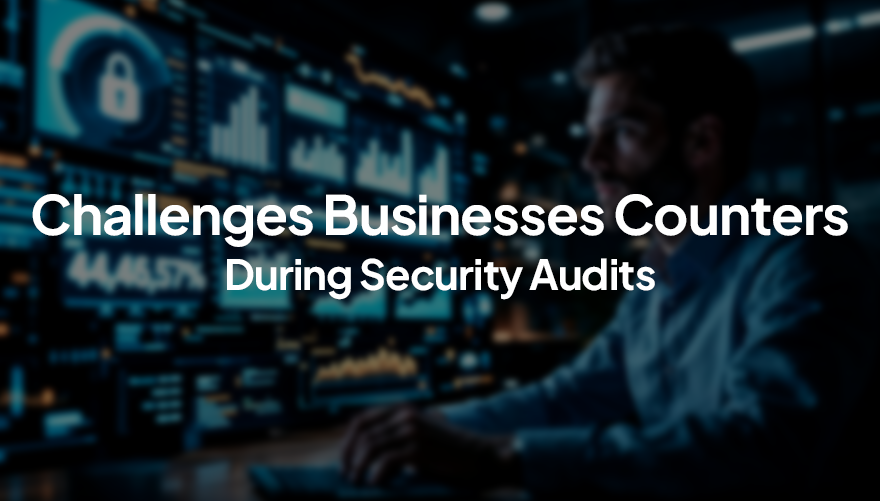
Security audits are important, but many companies often face challenges during the process. Whether suffering from loose internal practices or lacking reliable tools, these challenges ruin the system’s protection and delay compliance.
- Inconsistent Security Policies Across the Company
An accurate security compliance can be ruined due to inconsistent security polices across the company. Businesses must establish common policies so that audits can be responsive to actual threats and ensure accurate and consistent secure digital practices across the entire company.
- Limited Visibility for Hybrid and Remote Teams
Remote systems and hybrid models are difficult to monitor comprehensively. You cannot effectively audit without proper tools to provide complete system-monitoring capabilities. Robust security audit tools will automatically screen and remove vulnerabilities without disturbing the workflow.
- Fails to Adapt to Industry Standard Compliance
Failure to address evolving regulations such as GDPR, HIPAA, or PCI-DSS can result in audit failures. Reliable audit tools and internal systems can help in finding hidden critical issues. Regular training and management-targeted audits are essential for minimizing fines and keeping up with the global information state.
How To Perform a Robust Security Audit
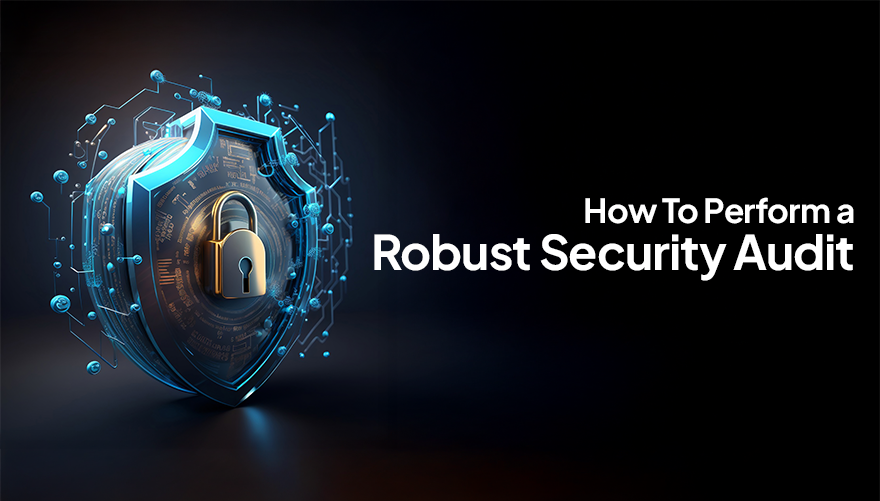
A complete security audit can protect your business from cyber risks and non-compliance. It inspects the system, apps, and data for concealed threats and provides real real-time reports. For CEOs and small business owners, simply performing regular audits builds client trust and ensures legal compliance.
- Prioritize Your Security Audit’s Objective
Concentrate on your highest priorities, whether it’s safeguarding data, ensuring the stability of your systems, or compliance: It helps to make your information security audit more productive and that the result will focus specifically on correct priorities of your business growth.
- Choose a Reliable Security Audit Software
Choose a reputable security audit tool that matches the needs of your organization. Automated scans rapidly inspect your network, apps, and devices. A reliable audit software security audit discovers hidden risks and reduces the need for manual efforts.
- Identify Critical Information and Data Flows
Create a list of critical assets, like databases, cloud servers and sensitive files. Evaluate where valuable information is stored and where it is transferred. A successful application security audit ensures no blind spots in your system.
Read More: PC Health Check
- Analyse and Create Real-Time Audit Reports
Use audit tools that offer real-time reports that emphasize exposures, non-compliance, and either systemic or programmatic weaknesses. This real-time understanding allows CEOs and IT leaders to make data-driven decisions to boost their cybersecurity and protect sensitive data.
- Regularly Implement Corrective Measures
Upgrade systems, passwords, updates, and train employees to tackle issues before they become a critical danger. Taking regular action after a security audit helps keep your systems strong, improves compliance, and builds long-term trust with clients and partners.
wAnywhere Free Workforce System Audit Tool: A FREE and Convenient Way to Strengthen Business Security and Compliance
Device audits can be time-consuming, costly, and burdensome, particularly for SMBs. Most firms have the problem of expensive and inconsistent audit software and poor documentation. wAnywhere’s free system audit tool provides automated device health checks for company-wide devices, helping CIOs, CISOs, IT managers, and system administrators to make informed decisions about workforce devices maintenance and security.
With wAnywhere’s free workforce system audit tool, get a detailed report of 40+ most crucial parameters of software and hardware health for your Windows computer systems. This will help you stay informed about your device’s condition and identify vulnerabilities proactively, allowing you to make smarter decisions to improve compliance and operational security.
Conclusion:
Regular security audits are crucial for a company to secure its data, stay compliant, and build trust. From analyzing system vulnerabilities to preparing your organization to be GDPR or HIPAA compliant, a comprehensive information security audit protects the security of your business.
wAnywhere’s free workforce system audit tool, you can measure the health and performance of your devices at a glance to ensure they remain compliant and free from security gaps. From outdated software and unauthorized applications to firewall status and disk usage, our audit tool provides a holistic overview—empowering IT teams to act quickly, reduce risks, and maintain a secure, efficient work environment.
Read More: Device Security Check: What It is & How to Complete it?

